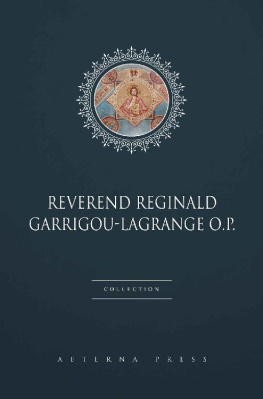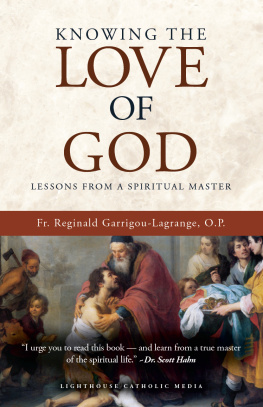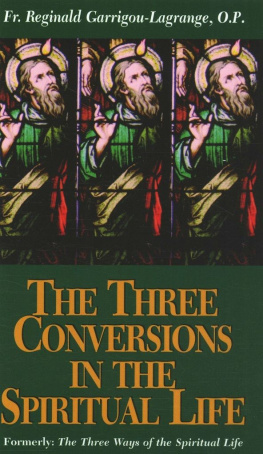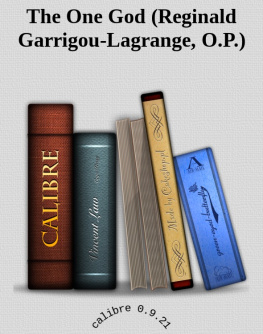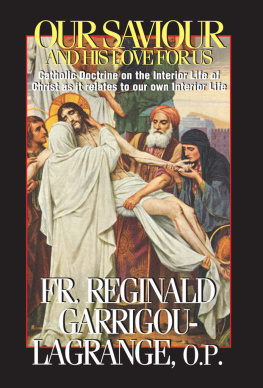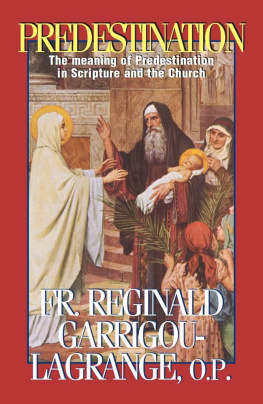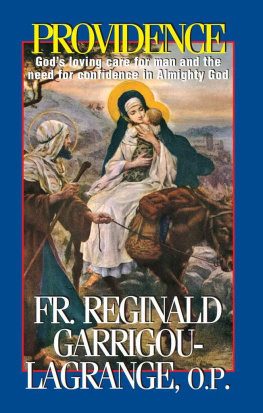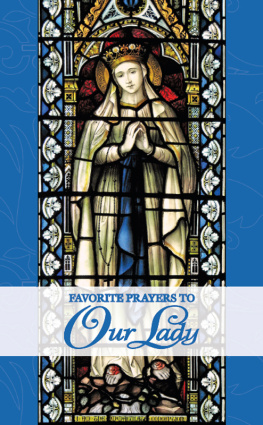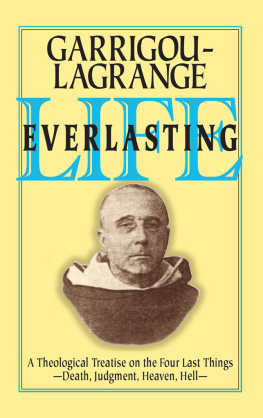Reginald Garrigou-Lagrange - Reverend Reginald Garrigou-Lagrange Collection
Here you can read online Reginald Garrigou-Lagrange - Reverend Reginald Garrigou-Lagrange Collection full text of the book (entire story) in english for free. Download pdf and epub, get meaning, cover and reviews about this ebook. year: 2016, publisher: Aeterna Press, genre: Religion. Description of the work, (preface) as well as reviews are available. Best literature library LitArk.com created for fans of good reading and offers a wide selection of genres:
Romance novel
Science fiction
Adventure
Detective
Science
History
Home and family
Prose
Art
Politics
Computer
Non-fiction
Religion
Business
Children
Humor
Choose a favorite category and find really read worthwhile books. Enjoy immersion in the world of imagination, feel the emotions of the characters or learn something new for yourself, make an fascinating discovery.
- Book:Reverend Reginald Garrigou-Lagrange Collection
- Author:
- Publisher:Aeterna Press
- Genre:
- Year:2016
- Rating:4 / 5
- Favourites:Add to favourites
- Your mark:
- 80
- 1
- 2
- 3
- 4
- 5
Reverend Reginald Garrigou-Lagrange Collection: summary, description and annotation
We offer to read an annotation, description, summary or preface (depends on what the author of the book "Reverend Reginald Garrigou-Lagrange Collection" wrote himself). If you haven't found the necessary information about the book — write in the comments, we will try to find it.
Reginald Garrigou-Lagrange: author's other books
Who wrote Reverend Reginald Garrigou-Lagrange Collection? Find out the surname, the name of the author of the book and a list of all author's works by series.
Reverend Reginald Garrigou-Lagrange Collection — read online for free the complete book (whole text) full work
Below is the text of the book, divided by pages. System saving the place of the last page read, allows you to conveniently read the book "Reverend Reginald Garrigou-Lagrange Collection" online for free, without having to search again every time where you left off. Put a bookmark, and you can go to the page where you finished reading at any time.
Font size:
Interval:
Bookmark:
REVEREND REGINALD
GARRIGOU-LAGRANGE O.P.
COLLECTION
16 BOOKS
COPYRIGHT 2016 BY AETERNA PRESS.
ALL RIGHTS RESERVED.
PUBLISHED BY AETERNA PRESS.
COVER DESIGN BY AETERNA PRESS.
KINDLE E-BOOK:
EISBN-13: 978-1-78647-058-4
WEBSITE
WWW.AETERNAPRESS.COM
BOOKS INDEX
REVEREND REGINALD GARRIGOU-LAGRANGE O.P. COLLECTION
Rginald Marie Garrigou-Lagrange, O.P. (February 21, 1877, Auch, FranceFebruary 15, 1964, Rome) was a Catholic theologian and is considered by some to be the greatest Catholic Thomist of the 20th century. He taught at the Pontifical University of St. Thomas Aquinas, commonly known as the Angelicum, in Rome from 1909 to 1960. By 1917 a special professorship in ascetical and mystical theology was created for him at the Angelicum, the first of its kind anywhere in the world. His great achievement was to synthesise the highly abstract writings of St Thomas Aquinas with the experiential writings of St John of the Cross, showing how they are in perfect harmony with each other.
BEATITUDE
REVEREND REGINALD GARRIGOU-LAGRANGE O.P.
COPYRIGHT 2016 BY AETERNA PRESS.
ALL RIGHTS RESERVED.
AVAILABLE IN PAPERBACK.
TRANSLATED BY PATRICK CUMMINS, D.S.B. MONK OF CWUEPTION ABBEY BIBTIOTHECA
B. HERDER BOOK CO.
R5 &17 SOUTH BROADWAY, ST. LOUIS 2, MO. AND 33 QUEEN SQUARE, LONDON, W. C.
THIS WORK IS A TRANSLATION OF DE BEATITUDINE, DE ACTIBUS HUMANIS ET HABITIBUS BY REGINALD GARRIGOU-LAGRANGE, O.P., PUBLISHED BY ROBERTO BERRUTI & CO., TORINO, ITALY.
CONTENTS
BEATITUDE
CHAPTER I
THE NATURE OF MORAL THEOLOGY
THE second part of the Summa begins with a prologue which outlines the purpose and scope of what is now called moral theology. Hence we dwell here, first on the nature of moral theology, and secondly on its divisions.
The word image (in the phrase image of God) signifies man as endowed with intellect, free will, and self-mastery. Hence, having treated of God, who is mans exemplar, we now proceed to consider Gods image, man, namely, who is the source of his own deeds, since he has free will and mastery of self.
What a sublime conception of moral theology! Gods liberty in creation is the prototype of mans free activities.
In the first part of the Summa, the Saint, treating of Gods creatures, had shown how man is the imperfect image of God, since, like God, man can know and love himself, thus representing not only the divine nature, but also the divine Trinity. Now he proceeds to show that man is Gods image, not only by his higher faculties, but also in his free activities, whereby he knows and loves not only himself, but also God, as God knows and loves Himself. This knowledge and love are indeed the final goal of all human life. But even here on earth a saint differs from his fellows by that love wherewith he loves not only himself, but God. From this sublime viewpoint moral theology is the science of imitating God. It produces a more and more perfect likeness of man to God. And this likeness would be mans goal even if God had not become man. But how much more perfect is this likeness when imitation of God has become imitation of Christ!
A more scholastic description of moral theology can be found in the first part: Although theology is more speculative than practical, it is nevertheless practical, in its treatment of human acts, by which man is led to perfect knowledge of God wherein lies eternal blessedness. Again, in the second question, outlining the entire Summa, he says: We will speak first of God, secondly of mans journey to God, thirdly of Christ who, as man, is our road to God.
Thus moral theology may be defined as that part of theology which, guided by revelation, studies human acts as the road to mans supernatural goal. Or, more briefly: a theological treatise which guides human acts to mans supernatural goal.
Moral theology, then, stands on a higher level than natural ethics. Natural ethics guides man to his last natural goal, which consists, not in the beatific vision and supernatural love, but in the knowledge, perfect but abstract, of God as the author of nature, and in the consequent natural love of God above all else. Ethics, properly speaking, does not deal with man as the image of the triune God. In the definition given above, many theologians avoid the phrase that part of theology, substituting for it that branch of knowledge. Hence arises the following question: Does moral theology differ specifically from dogmatic theology?
The distinction of moral and dogma became distinct in the Summa. But some later theologians, Vasquez, for example, maintained that moral and dogma are not two parts of one science, but two distinct sciences. In line with this tendency, moral theology, ignoring dogmatic questions (e.g., grace, merit, the nature of infused virtue), often became a casuistic treatise. In our view, casuistry is but an inferior exemplification, just as asceticism and mysticism are superior exemplifications, of moral theology.
Are dogma and moral two distinct branches of knowledge? To this question our answer must be negative: theology is one science, not many. The proof follows.
Scientific unity arises from unity in subject matter and viewpoint. Now all things discussed in theology belong to one and the same subject matter, God, and are approached from one and the same viewpoint, revelation. When theology does speak of creatures, it speaks of them only in their relation to God, and draws its conclusions from the viewpoint of revelation.
St. Thomas writes: Sacred doctrine remaining one, includes the subject matter of all philosophic sciences, because it sees them under the light of its own viewpoint. Hence, whereas one philosophic science is speculative and another practical, sacred doctrine is both speculative and practical, just as God, by one and the same act, knows both Himself and His works. But theology, since it treats principally of God and only secondarily of human acts, is more speculative than practical. It deals with human acts as leading to that perfect knowledge of God which is eternal blessedness.
Dogma and moral, then, are but two parts, two branches, of one and the same science. In each, under one and the same light of revelation, the viewpoint is God: God either in Himself, or as efficient and exemplary source, or lastly, as the end, purpose, and goal of our life.
Now God as God, as Deity, is an object higher than that reality which is the object of metaphysics, higher than moral good which is the object of ethics. Here appears the wonderful hierarchy of knowledge: division below, unity on high. Theology, imprinted on the created mind by God, rises on high above philosophy and history, and is subordinated only to the uncreated mind of God.
It follows, then, that to consider dogma and moral as two sciences is to ignore the sublimity and simplicity of moral theology. Separated from dogma, reduced to casuistry, under a kind of materialistic and statistic tendency, moral theology loses its native elevation and dignity.
Here follow two corollaries. First corollary. Physical science has many integral parts: mechanics, hydrostatics, hydrodynamics, acoustics, optics, thermodynamics. Theology, too, remains one science, notwithstanding the distinctions, that between positive theology and systematic theology, and that between dogmatic theology and moral theology.
Positive theology has three integral parts:
a) biblical, which assembles truths revealed in Holy Scripture;
b) patristic, which expounds the teaching of the Holy Fathers;
c) symbolic, which examines ecclesiastical creeds, definitions, and declarations.
Systematic theology has two integral parts:
a) dogmatic, which discourses on the articles of faith: God, creation, the Incarnation, the Redemption, the sacraments, the four last things;
Next pageFont size:
Interval:
Bookmark:
Similar books «Reverend Reginald Garrigou-Lagrange Collection»
Look at similar books to Reverend Reginald Garrigou-Lagrange Collection. We have selected literature similar in name and meaning in the hope of providing readers with more options to find new, interesting, not yet read works.
Discussion, reviews of the book Reverend Reginald Garrigou-Lagrange Collection and just readers' own opinions. Leave your comments, write what you think about the work, its meaning or the main characters. Specify what exactly you liked and what you didn't like, and why you think so.

